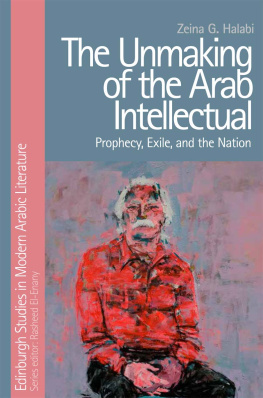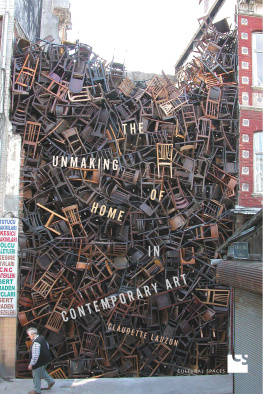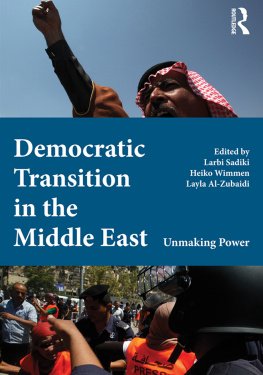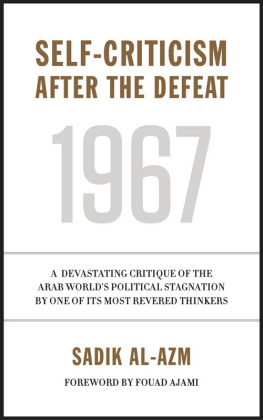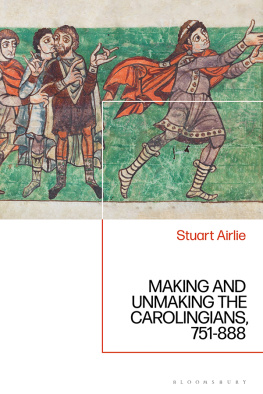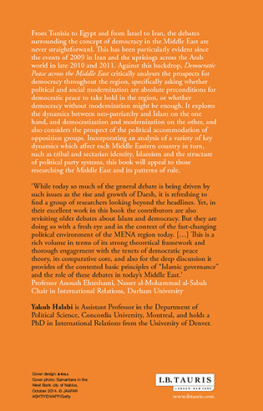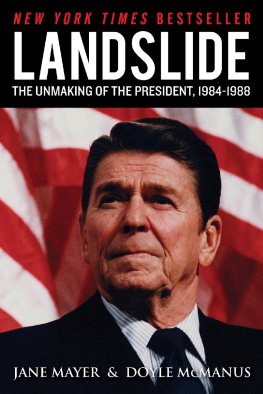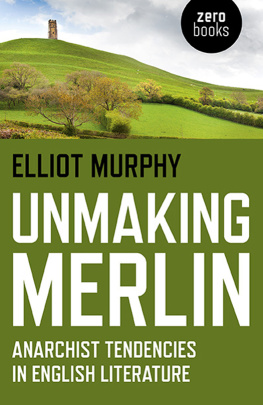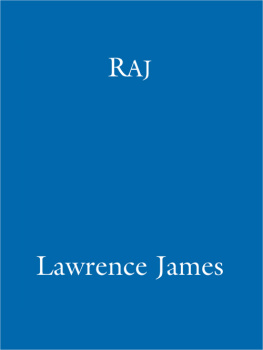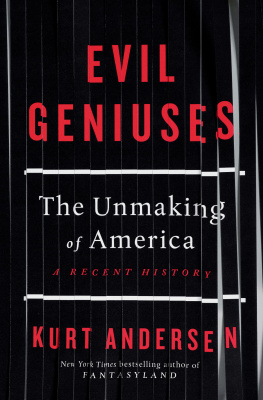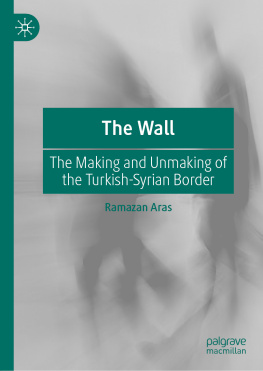Halabi - The Unmaking of the Arab Intellectual
Here you can read online Halabi - The Unmaking of the Arab Intellectual full text of the book (entire story) in english for free. Download pdf and epub, get meaning, cover and reviews about this ebook. publisher: Edinburgh University Press, genre: Science. Description of the work, (preface) as well as reviews are available. Best literature library LitArk.com created for fans of good reading and offers a wide selection of genres:
Romance novel
Science fiction
Adventure
Detective
Science
History
Home and family
Prose
Art
Politics
Computer
Non-fiction
Religion
Business
Children
Humor
Choose a favorite category and find really read worthwhile books. Enjoy immersion in the world of imagination, feel the emotions of the characters or learn something new for yourself, make an fascinating discovery.
The Unmaking of the Arab Intellectual: summary, description and annotation
We offer to read an annotation, description, summary or preface (depends on what the author of the book "The Unmaking of the Arab Intellectual" wrote himself). If you haven't found the necessary information about the book — write in the comments, we will try to find it.
Halabi: author's other books
Who wrote The Unmaking of the Arab Intellectual? Find out the surname, the name of the author of the book and a list of all author's works by series.
The Unmaking of the Arab Intellectual — read online for free the complete book (whole text) full work
Below is the text of the book, divided by pages. System saving the place of the last page read, allows you to conveniently read the book "The Unmaking of the Arab Intellectual" online for free, without having to search again every time where you left off. Put a bookmark, and you can go to the page where you finished reading at any time.
Font size:
Interval:
Bookmark:

The Unmaking of the Arab Intellectual
Edinburgh Studies in Modern Arabic Literature Series Editor: Rasheed El-Enany
Writing Beirut: Mappings of the City in the Modern Arabic Novel
Samira Aghacy
Autobiographical Identities in Contemporary Arab Literature
Valerie Anishchenkova
The Iraqi Novel: Key Writers, Key Texts
Fabio Caiani and Catherine Cobham
Sufism in the Contemporary Arabic Novel
Ziad Elmarsafy
Gender, Nation, and the Arabic Novel: Egypt 18922008
Hoda Elsadda
The Unmaking of the Arab Intellectual: Prophecy, Exile and the Nation
Zeina G. Halabi
Post-War Anglophone Lebanese Fiction: Home Matters in the Diaspora
Syrine Hout
Nasser in the Egyptian Imaginary
Omar Khalifah
War and Occupation in Iraqi Fiction
Ikram Masmoudi
The Arab
Nah  ah: The Making of the Intellectual and Humanist Movement
ah: The Making of the Intellectual and Humanist Movement
Abdulrazzak Patel
Sonallah Ibrahim: Rebel with a Pen
Paul Starkey
www.edinburghuniversitypress.com/series/smal
The Unmaking of the Arab Intellectual
Prophecy, Exile and the Nation
Zeina G. Halabi

To Khaled Saghieh
Edinburgh University Press is one of the leading university presses in the UK. We publish academic books and journals in our selected subject areas across the humanities and social sciences, combining cutting-edge scholarship with high editorial and production values to produce academic works of lasting importance. For more information visit our website: edinburghuniversitypress.com
Zeina G. Halabi, 2017
Edinburgh University Press Ltd
The Tun Holyrood Road
12 (2f) Jacksons Entry
Edinburgh EH8 8PJ
A CIP record for this book is available from the British Library
ISBN 978 1 4744 2141 6
The right of Zeina G. Halabi to be identified as author of this work has been asserted in accordance with the Copyright, Designs and Patents Act 1988 and the Copyright and Related Rights Regulations 2003 (SI No. 2498).
T he Edinburgh Studies in Modern Arabic Literature is a new and unique series which will, it is hoped, fill in a glaring gap in scholarship in the field of modern Arabic literature. Its dedication to Arabic literature in the modern period, that is, from the nineteenth century onwards, is what makes it unique among series undertaken by academic publishers in the English-speaking world. Individual books on modern Arabic literature in general or aspects of it have been and continue to be published sporadically. Series on Islamic studies and Arab/Islamic thought and civilisation are not in short supply either in the academic world, but these are far removed from the study of Arabic literature qua literature, that is, imaginative, creative literature as we understand the term when, for instance, we speak of English literature or French literature, etc. Even series labelled Arabic/Middle Eastern Literature make no period distinction, extending their purview from the sixth century to the present, and often including non-Arabic literatures of the region. This series aims to redress the situation by focusing on the Arabic literature and criticism of today, stretching its interest to the earliest beginnings of Arab modernity in the nineteenth century.
The need for such a dedicated series, and generally for the redoubling of scholarly endeavour in researching and introducing modern Arabic literature to the Western reader has never been stronger. The significant growth in the last decades of the translation of contemporary Arab authors from all genres, especially fiction, into English; the higher profile of Arabic literature internationally since the award of the Nobel Prize for Literature to Naguib Mahfouz in 1988; the growing number of Arab authors living in the Western diaspora and writing both in English and Arabic; the adoption of such authors and others by mainstream, high-circulation publishers, as opposed to the academic publishers of the past; the establishment of prestigious prizes, such as the International Prize for Arabic Fiction (the Arabic Booker), run by the Man Booker Foundation, which brings huge publicity to the shortlist and winner every year, as well as translation contracts into English and other languages all this and very recently the events of the Arab Spring have heightened public, let alone academic, interest in all things Arab, and not least Arabic literature. It is therefore part of the ambition of this series that it will increasingly address a wider reading public beyond its natural territory of students and researchers in Arabic and world literature. Nor indeed is the academic readership of the series expected to be confined to specialists in literature in the light of the growing trend for interdisciplinarity, which increasingly sees scholars crossing field boundaries in their research tools and coming up with findings that equally cross discipline borders in their appeal.
With both the Arab national and cultural projects unrecognisably different today from what they were at the late decades of the nineteenth century and early ones of the twentieth (the nahda or awakening period) and with all the metamorphoses that these interdependent projects have undergone from that time to the present day, a reassessment of the role of the Arab intellectual the writer, the novelist, the poet, the filmmaker is overdue. From the very beginning of the nahda, the Arab intellectual has borne the burden of the educator, the moderniser, the connector between East and West, the importer and adaptor of foreign thought and values, the very prophet of a brave new world.
This essentially romantic perception of the role of the intellectual, whether as self-perceived by the intellectuals themselves, or as projected on them by society, was bound to be subverted by the multi-faceted disasters that befell the Arab world since at least the second half of the twentieth century, i.e. more or less since the end of colonialism. The failure of democracy, the dictatorships that replaced the rule of imperial powers in the post-independence era, the defeats in wars with Israel, the economic failure, the civil wars, and more recently the fiasco of the Arab Spring all this was inevitably to cause the perception of the intellectual as prophet to implode, to become redundant, ironic, a false prophecy.
This is what Zeina G. Halabi is attempting to explore in this study. Chapter by chapter she juxtaposes authors and texts (and indeed films and directors) from the past with others from the present to demonstrate the conceptual change in the mission of the writer as prophet, bringing the discussion right up to the Arab Spring with its further implications for the role of the intellectual.
Professor Rasheed El-Enany, Series Editor,
Emeritus Professor, University of Exeter;
Professor of Modern Arabic & Comparative Literature,
Doha Institute for Graduate Studies
I have followed the style and transliteration guidelines of the Chicago Manual of Style (15th edn) and the International Journal of Middle Eastern Studies. For Arab authors names, I have chosen the most commonly used transliteration in English. I have transliterated the glottal stop as 
Font size:
Interval:
Bookmark:
Similar books «The Unmaking of the Arab Intellectual»
Look at similar books to The Unmaking of the Arab Intellectual. We have selected literature similar in name and meaning in the hope of providing readers with more options to find new, interesting, not yet read works.
Discussion, reviews of the book The Unmaking of the Arab Intellectual and just readers' own opinions. Leave your comments, write what you think about the work, its meaning or the main characters. Specify what exactly you liked and what you didn't like, and why you think so.

